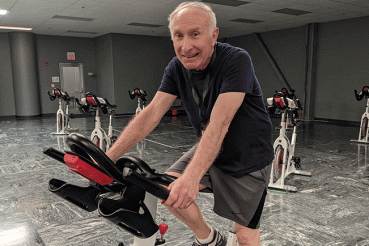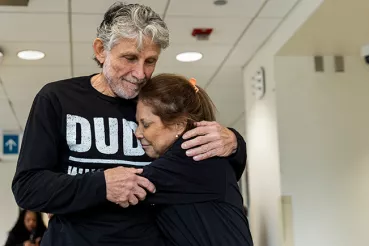"Dylan is the hardest working kid I know, and I'm not just saying that because he's my son," says Bill Suca, Dylan's father. "He's always known he had this condition, but he's never seen it as a disability."
And with the technology that's available to patients like Dylan with congenital heart defects, he has the prospect of leading a normal, active life.
Playing with heart
Baseball has been Dylan's great love since he was four years old, about the same time he was diagnosed with a bicuspid aortic valve (BAV). With his dad as his early coach, Dylan has played baseball at a fairly high level even with a heart condition. Only in high school did he start developing stenosis, or the narrowing of the aortic valve, to a degree that it required treatment.
The aortic valve is located within the heart at the origin of the aorta, the main artery that carries blood away from the heart. A normal aortic valve has three "leaflets" that close and open in unison. With a BAV, the valve essentially has two "leaflets," which can lead to a narrowed opening or "stenosis" of the valve. The degree of stenosis can progress with time, which was the case for Dylan.
"The aortic valve is a very involved structure," says Brie Ann Muller MD, a Rush pediatric cardiologist and Dylan's doctor. With BAV, some patients show no symptoms and may never need any intervention, while some present in infancy and need surgery. If the stenosis progresses to the point of needing surgery, patients may develop symptoms, including shortness of breath, fatigue, chest pain and palpitations.
The toughest challenge: a ‘major procedure’
Bill and his wife, Donna, were dismayed when Muller told them that Dylan's stenosis was getting worse and would have to be addressed. The first procedure Dylan underwent, when he was a senior in high school, was an aortic valvuloplasty. A specialized pediatric cardiologist inserted a balloon into his heart via a catheter to expand the narrowed aortic valve.
Soon, it became clear Dylan would need more heart surgery. A common effect of valvuloplasty, the balloon procedure that expands the aortic valve, is regurgitation — a leaky valve. Dylan's leaky valve worsened over time, and by last summer, the team at Rush determined that they needed to fix the problem. Dylan and his parents chose to repair the valve rather than replace it — not a permanent solution but one that should keep Dylan's heart working for two to 15 additional years. In the meantime, perhaps some beneficial new technology will become available that can offer more lasting results.
The valve repair required Dylan to have cardiopulmonary bypass surgery, which is "definitely a major procedure," says Muller. Surgeons got a clear field to work on, to reinforce the valve, by circulating Dylan's blood through a machine that oxygenated it and then sent it back through the rest of his body.
Dylan's surgery, which required him (and his mother) to stay in the hospital for a full week, was "the hardest thing we've ever done," Donna says. "But the doctors, the nurses, everybody there was phenomenal."
The Sucas also appreciate that they have been able to see Muller for some follow-up appointments at a Rush satellite facility in Joliet. "It's so helpful to be able to have some appointments close to home," Donna says.
Back on the mound, with a passion
Three weeks after his surgery, Dylan started college at Illinois State University in Normal. He knew he would not be selected to play baseball there. Soon, however, he realized he wasn't ready to hang up his spikes; he decided to transfer to a community college with a baseball program — Spoon River College had previously expressed interest in him — and continue playing as long as he could.
"I wanted to finish out my baseball career more on my terms," he says.
As soon as he got the go-ahead from his doctors at Rush, he began working out to get in shape for baseball season this spring.
Dylan takes a low dose of blood pressure medicine, and he checks in regularly with Muller, but for the most part, he's been able to just enjoy being a college student-athlete. "I feel stronger than I ever have before," he says. "And the surgery gave me a reset, a different perspective. I feel like I cherish the chance to play baseball even more now."
Bill say his son understands how fortunate he is that Rush physicians were able to fix his heart defect. "He appreciates his life. Every situation is different, but there's hope for these kids."




